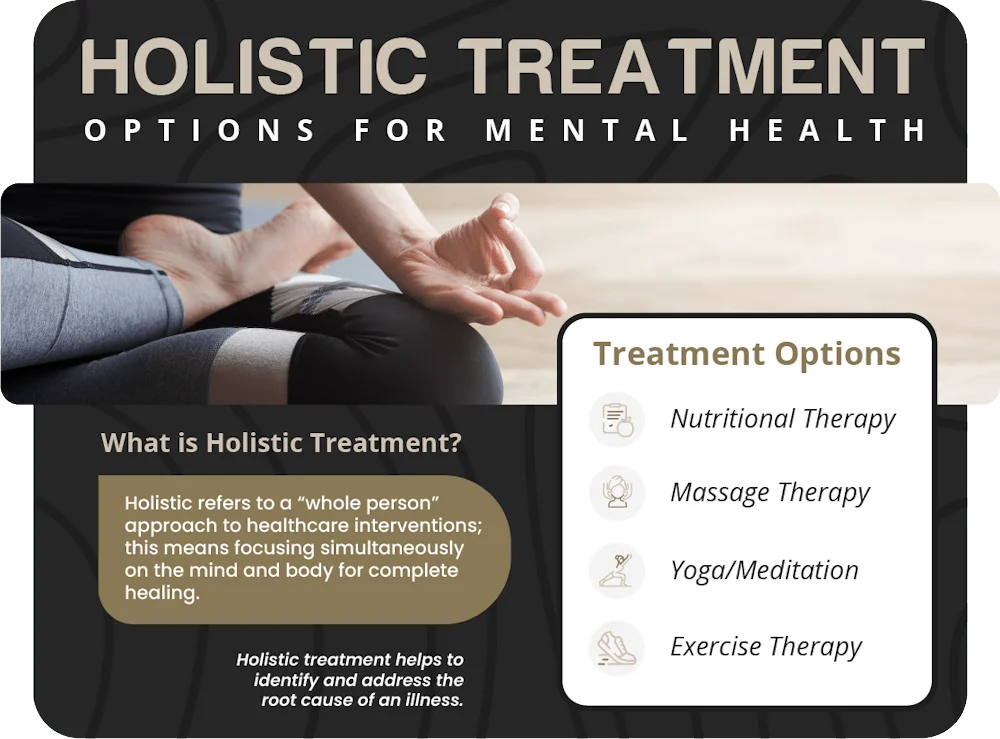
If you’re grappling with addiction and seeking assistance, discover the ins and outs of holistic therapy in Los Angeles, California. Many individuals turn to a specialized addiction treatment center in Los Angeles that focuses on holistic healing, offering comprehensive care that addresses the root causes of addiction. Explore its incorporation into rehab programs, learn about specific types like acupuncture and meditation, and understand how a holistic approach can contribute to mental and physical healing, with holistic healing as a key goal of these programs. Evaluate the effectiveness of these techniques to determine if a holistic rehab program aligns with your unique recovery needs.
Introduction to Addiction Treatment
Addiction treatment is a journey that goes far beyond simply addressing substance use. True recovery requires a comprehensive approach that considers the physical, emotional, and spiritual dimensions of each individual. Holistic addiction treatment has become increasingly popular because it recognizes that addiction is often just one symptom of deeper, underlying issues—such as mental health disorders, trauma, or a sense of spiritual disconnection. By identifying and addressing these underlying causes, these treatment programs aim to foster long-term recovery and enhance overall well-being.
Understanding Drug Addiction
Drug addiction is a complex, chronic disease that impacts millions of lives. It is marked by compulsive drug-seeking and use, even when it leads to harmful consequences. The roots of drug addiction often lie in a combination of genetic predisposition, environmental influences, and psychological factors. Its effects reach far beyond the physical, often taking a toll on mental health and emotional stability.
Holistic treatment programs understand that drug addiction is not just a physical challenge—it is deeply intertwined with mental health conditions, unresolved trauma, and spiritual well-being. By focusing on these underlying causes, holistic treatment programs offer a path to overcome addiction that goes beyond symptom management.
What is Holistic Therapy?

Holistic treatment for addiction, also known as holistic health or holistic medicine, is an approach to healthcare that considers the whole person—mind, body, spirit, and emotions—in the quest for optimal health and wellness. The underlying principle of holistic therapy is that all these aspects are interconnected and that an imbalance in one area can affect the others.
This approach emphasizes the importance of addressing the root causes of issues rather than merely treating symptoms. Holistic therapy often incorporates a variety of alternative and complementary therapies and healing modalities alongside conventional medical practices. These may include:
- Yoga
- Tai chi
- Guided meditation
- Acupuncture
- Massage therapy
- Spiritual therapy/services
- Proper nutrition
- Mindfulness-based therapies
- Art therapy
- Animal-assisted therapy
- Breathing exercises
- Life skills development
The goal of holistic therapy is to encourage individuals to take an active role in their health and well-being. It acknowledges the uniqueness of each person and seeks to create a personalized approach to healthcare that considers the individual’s lifestyle, environment, and overall context. Holistic therapy in Los Angeles is not meant to replace traditional treatment or traditional treatments but to complement them, fostering a comprehensive and integrated approach to health.
What is a Holistic Therapy Program for Addiction?
A holistic treatment program for addiction is a comprehensive solution that fundamentally transforms the recovery process. This innovative method utilizes personalized, non-medical strategies to address specific challenges, including emotional disturbances, obsessive thoughts, and nutritional deficiencies. It covers a wide range of methods, often combined with medical services and supported by holistic doctors and holistic healers as part of a multidisciplinary team, to address both physical and emotional symptoms.
In early recovery, holistic rehab in California is crucial for overcoming challenges like lack of sleep, poor diet, and emotional stress. The flexible and gentle nature of these approaches allows easy integration with assistance, offering tailored solutions for each individual. Holistic therapy usually involves five key areas for a well-rounded approach.
- Physical: Fitness, nutrition, sleep, healthy behaviors, and improving physical health.
- Emotional: Balancing emotions, developing coping skills, creating a safe space, and addressing mental illness.
- Social: Building relationships, avoiding isolation, and creating sober networks.
- Spiritual: Finding purpose, appreciating life, and connecting with oneself.
- Intellectual: Setting boundaries, planning for the future, and developing essential skills.
A holistic treatment program at a rehab center provides a personalized roadmap for lasting recovery by addressing various aspects of substance use disorders. It is designed to address substance abuse, substance use disorder, and the underlying causes through comprehensive substance abuse treatment and substance abuse treatment programs. The overall structure of a holistic addiction treatment program ensures that each individual receives the support they need for effective recovery in a supportive rehab center environment.
Benefits of Holistic Drug Rehab
Holistic drug rehab provides a wide array of benefits for those seeking to break free from addiction and build a healthier future. Some of the key advantages include:
- Comprehensive Care: Holistic drug rehab addresses the physical, emotional, and spiritual aspects of recovery, ensuring that every part of an individual’s well-being is supported.
- Focus on Underlying Causes: Instead of just treating the symptoms of addiction, holistic programs work to uncover and heal the root causes, such as trauma or mental health challenges.
- Alternative Therapies: Individuals can benefit from a variety of alternative therapies—including meditation, yoga, and art therapy—that help manage stress, promote relaxation, and encourage self-expression.
- Supportive Community: Being surrounded by others who are on a similar journey fosters a sense of belonging and mutual encouragement, which is vital for recovery.
- Personalized Treatment Plans: Each person receives a treatment plan tailored to their unique needs, preferences, and goals, increasing the likelihood of long-term success.
- Long-Term Recovery Focus: Holistic drug rehab is committed to helping individuals achieve lasting recovery, not just short-term sobriety, by equipping them with healthy coping skills and strategies for ongoing well-being.
By embracing a holistic approach, individuals are empowered to heal on every level and build a strong foundation for lifelong recovery.
What are the Types of Holistic Therapies Used in Addiction Rehab?

In addiction rehab, various types of holistic therapies are often used to address the physical, mental, and emotional aspects of recovery. A recovery center in Los Angeles may offer a holistic treatment program that integrates evidence-based therapies such as cognitive behavioral therapy, acceptance and commitment therapy, and dialectical behavioral therapy, along with other holistic modalities to support overall well-being.
Some common holistic therapies include:
Our brains are powerful tools that stay clear under pressure. Many holistic treatment programs use mindfulness meditation for its proven benefits. Practices like yoga, tai chi, qigong, meditation, and others help relieve stress, improve sleep, and support mental health. These activities contribute to overall well-being and build essential coping skills for individuals in recovery. Engaging in these practices equips them with valuable tools to navigate challenges and maintain well-being.
Nutritional therapy is a key part of holistic programs for addiction. It focuses on a balanced, nutrient-rich diet to support physical and mental healing. Nutritionists provide personalized meal plans and education and may recommend supplements to address deficiencies and boost overall health. This holistic approach recognizes the importance of nutrition in the recovery journey, promoting a well-rounded path to wellness.
Acupuncture is a traditional Chinese medicine treatment integrated into holistic therapy programs for addiction. This ancient practice involves the insertion of ultra-thin needles into specific points along the body’s energy meridians. By doing so, acupuncture aims to not only alleviate physical pain but also diminish cravings, ease withdrawal symptoms, and contribute to restoring overall balance in the body and mind. This holistic approach recognizes the interconnected nature of physical and emotional well-being, making acupuncture a valuable component in the comprehensive journey toward addiction recovery.
Massage therapy is another valuable component integrated into holistic therapy programs for addiction. This hands-on approach offers relief by easing muscle tension, improving circulation and lymphatic drainage, and boosting endorphins, contributing to an overall sense of relaxation during the recovery process. Beyond its physical benefits, targeted massage techniques may play a role in reducing cravings and alleviating anxiety, providing individuals with a holistic and soothing experience. The incorporation of massage therapy underscores the comprehensive nature of holistic programs, addressing both the physical and emotional aspects of addiction recovery.
Daily exercise is a fundamental aspect of holistic addiction recovery programs. It establishes routines, reduces stress, and improves physical strength. Most therapy centers offer various activities like rock climbing, canoeing, horseback riding, or hiking. Additionally, access to gyms or memberships is often provided, promoting the development of healthy muscles and offering a secure outlet for stress. This comprehensive approach recognizes the importance of physical activity in promoting overall well-being during the recovery journey.
Art and music therapy encompass expressive arts activities such as painting, drawing, and playing musical instruments. These therapies aid individuals in exploring emotions, enhancing self-expression, and creating a positive outlet for stress. By engaging in these creative endeavors, individuals can discover new means of communication and personal growth, contributing to their overall well-being during the recovery process.
These holistic therapies, when integrated into addiction recovery programs, aim to address the multifaceted nature of addiction and support individuals in achieving lasting physical, mental, and emotional well-being.
Alcohol Addiction Treatment
Alcohol addiction presents unique challenges that require specialized care and attention. Withdrawal from alcohol can be particularly dangerous, making professional support essential during the detox process. Holistic addiction treatment programs for alcohol use disorder go beyond managing withdrawal symptoms—they address the physical, psychological, and spiritual dimensions of recovery.
These programs often incorporate alternative treatments like yoga, meditation, and art therapy to help manage stress, rebuild self-esteem, and foster emotional resilience. By focusing on the whole person and not just the addiction, holistic alcohol addiction treatment supports individuals in achieving lasting sobriety and improved overall well-being.
How Effective Are Holistic Techniques in Rehab?

Holistic techniques aim to address not only the symptoms of addiction but also the underlying factors that contribute to it. It focuses on the person as a whole, considering physical, mental, emotional, and spiritual aspects. An addiction treatment center in Los Angeles may implement holistic care as part of its comprehensive approach, combining conventional and alternative therapies to support long-term recovery. The integration of holistic approaches, such as mindfulness meditation, yoga, nutritional counseling, and other mind-body practices, can provide individuals with valuable tools to cope with stress, manage emotions, and improve overall well-being.
Research has suggested that incorporating holistic techniques into addiction treatment can be beneficial for some individuals. Mindfulness-based interventions, for example, have shown promise in reducing substance use and improving emotional well-being. Yoga and other mind-body practices have also demonstrated positive effects on stress reduction and mental health.
It’s important to remember that holistic techniques are often used in conjunction with traditional evidence-based therapies, such as cognitive-behavioral therapy and medication-assisted treatment. The combination of these approaches aims to provide a comprehensive and individualized treatment plan.
However, the effectiveness of holistic techniques may not be universal, and individual responses can vary. What works well for one person may not work as effectively for another. Additionally, the lack of standardization in holistic practices and the limited availability of rigorous scientific studies on some approaches contribute to the need for personalized and integrated treatment plans.
Importance of Support in Recovery
Support is a cornerstone of successful addiction recovery, especially within a holistic framework. Having a strong network of encouragement—from family, friends, peers, and medical professionals—can make all the difference in maintaining motivation and preventing relapse. Holistic addiction treatment programs often include group therapy sessions, peer support groups, and aftercare planning to ensure individuals are never alone on their journey. These supportive environments foster connection, accountability, and shared understanding, which are vital for building healthy coping mechanisms and managing stress.
Additionally, ongoing support helps individuals navigate challenges, celebrate milestones, and stay committed to their personalized treatment plan. By prioritizing support, holistic recovery programs empower individuals to achieve long-term success and a renewed sense of well-being.
Finding Holistic Therapy Centers
Numerous treatment centers integrate holistic therapy into their inpatient and outpatient programs, emphasizing the importance of balancing all aspects of life. In Los Angeles, you can find a variety of holistic rehab centers and recovery centers that focus on comprehensive healing, personalized care, and long-term recovery. Holistic therapy complements various approaches, such as medical detox, to addressing substance use disorders.
When seeking a holistic therapy center for addiction treatment, consider the following steps to find a facility that aligns with your needs:
- Research Treatment Centers. Start by researching holistic therapy centers that specialize in addiction treatment. Look for reputable facilities with experienced and licensed professionals. Consider finding an addiction treatment center that offers holistic approaches tailored to your recovery goals.
- Assess Holistic Approaches. Evaluate the range of holistic approaches offered. Different centers may provide various therapies, such as mindfulness meditation, yoga, acupuncture, nutritional counseling, and more. Choose a center that offers a comprehensive set of holistic techniques.
- Consider Individualized Plans. Look for centers that tailor treatment plans to individual needs. Personalized plans consider factors such as the type and severity of addiction, mental health status, and any co-occurring disorders.
- Check reviews and testimonials. Read reviews and testimonials from former clients to gain insights into the center’s reputation and the experiences of others who have undergone treatment.
- Inquire About Aftercare Programs. Inquire about aftercare programs and support services. A holistic approach to addiction treatment often involves ongoing support to help individuals maintain their recovery after leaving the treatment center.
- Check insurance coverage. Confirm whether the holistic therapy center accepts your insurance and if there are any out-of-pocket costs. Understanding the financial aspects of treatment is crucial for planning.
Taking the time to thoroughly research and assess holistic therapy centers will help you make an informed decision and choose a facility that aligns with your preferences and needs for addiction treatment.
Westwind Recovery®® Can Assist with Holistic Treatment Today

Westwind Recovery®® is here to guide you on your journey to holistic treatment. Take the first step toward healing and wellness by reaching out to us today. Our team is ready to provide the support you need for a transformative recovery experience. Let us help you on the path to a healthier and more fulfilling life.
Whether by habit or by trying to seek a different kind of experience, many people often make the mistake of taking alcohol with substances. One of the more common instances of this is when people take pain pills and alcohol together.
47,500 deaths annually are attributable to the long-term health consequences of drinking too much over time. 95,000 Americans die from alcohol-related causes annually; 68,000 of them are men. 27,000 of them are women.
While some people take medications like oxycodone with alcohol under the misguided notion that the alcohol would make the pain-killing action faster, there are those who take the medication with alcohol in the hopes of a greater high.
This is a known phenomenon regarding those who abuse painkillers, as those who have abused substances like oxycodone develop an increased threshold for it, and thereby require more of it, or something to intensify its effect, to get the high they are looking for.
Why Are Some People Hooked on Pain Pills?
Millions of people suffer from chronic pain each day. Whether it be from some undiagnosed source or from an old injury, chronic pain could range from simply being a constant nuisance all the way to being periodically debilitating.
For many, the only way to deal with it is to pop a pill and the pain will go away for a while, or at least come down to more manageable levels. This habit of popping pills, however, is the surest and easiest way to develop an addiction to painkillers, and the statistics around it are nothing short of alarming.
In the US alone, a 2020 report from the National Center for Drug Abuse Statistics states at least 12% of all young adults aged 12 and older have misused prescription medication, including painkillers.
Of the total number of people with a drug disorder recorded in 2020, at least 24.7% of them use prescription painkillers and heroin. Add to this the fact that the same report indicates that 28,320 million Americans aged 12 and older have an alcohol use disorder.
An even more alarming fact is the growing rate of overdose deaths related to painkiller abuse. In 2017 alone, at least 17,029 prescription painkiller-related overdose deaths were recorded. Many of those who were lucky enough to make it to rehabilitation admitted they acquired the painkillers they abused through a friend or a relative, usually by using their prescription or stealing from them outright.
How Chronic Pain Can Lead to Mixing Pain Pills and Alcohol
Chronic pain is defined as any pain lasting more than 12 weeks. It can be caused by an injury, disease, or even a mental health condition. Many people who live with chronic pain turn to substances like alcohol or drugs in an attempt to self-medicate.
Unfortunately, mixing substances can often lead to even more problems. For example, mixing pain pills and alcohol can result in liver damage, respiratory problems, and an increased risk of overdose.
Moreover, chronic pain sufferers are more likely to develop substance use disorders. In fact, nearly half of all people receiving treatment for chronic pain also have a diagnosis of substance abuse.
How Prevalent is Alcohol Misuse?
California sees the nation’s highest number of alcohol-related deaths but has a low rate of underage drinking. 16.6% of California adults over 18 binge drink at least once per month.
The median number of drinks per binge is 5.5; 25% of most active drinkers consume a median of 7.7 drinks per binge. Binge-drinking adults in California binge a median of 1.6 times monthly; 25% of most active drinkers binge 3.7 times per month.
Most American adults consume alcohol at least once in their lifetime. Among them, 6.7% will develop Alcohol Use Disorder (AUD). 10.2% of Americans aged 12 years and older had Alcohol Use Disorder in 2020.
24.0% of people aged 18 years and older reported binge drinking in the last 30 days; this is a 7.0% decline between 2019 and 2020. Every day, 385 Americans die as a result of excessive alcohol use.

Are Mixing Alcohol and Pain Pills Really Dangerous?
In itself, alcohol is already a hazardous substance, particularly if taken frequently and in quantities that exceed the body’s capacity to properly filter it out. While it might be portrayed as part of an adult’s leisurely lifestyle, alcohol produces less-than-glamorous side effects that would definitely make most people think twice about taking that nightcap.
Alcohol has both short-term and long-term effects, with many of these effects being chronic. The short-term effect includes:
- Drowsiness
- Euphoria (in some cases)
- Diminished inhibitions
- Lack of impulse control
- Mood swings
- Slurred speech
- Nausea
- Vomiting
- Diarrhea
- Headaches
- Compromised sensory acuity (hearing and vision)
- Loss of coordination
- Compromised decision-making
Taking alcohol for quite some time will cause more severe side effects, as more parts of the body become affected by the toxicity brought on by alcohol abuse.
- Increased anxiety and irritability
- Disrupted sleep patterns
- Insomnia
- Compromised immune system
- Affected sexual drive and performance
- Drastic weight change
- Inability to focus
- Frequent stupor
- Compromised cognitive functions
These effects are brought on by alcohol abuse alone. Combined with other substances, such as painkillers, the effects could be far worse and might even become life-threatening.
As alcohol already has a powerful depressant effect, combined with a substance that also acts as another depressant or sedative, vital functions such as breathing, heart rate, and thinking could be severely impaired to the point where hospitalization is needed.
Possible effects when alcohol is mixed with substances:
Depressants
When alcohol is taken with depressants, the effect could be a rapid onset of dizziness, loss of coordination, inability to properly perceive surroundings, loss of bowel control, impaired cognitive functions, memory loss, slipping into a coma, and potential death.
Prescription Medications
Taking alcohol with prescription medications that have opiate or opioid properties could lead to severely compromised breathing, drastically slowed heart rate, decreased blood pressure, loss of consciousness, slipping into a coma, and potential death.
Stimulants
When taken with stimulants, the problems begin with the inability of the person to determine just how intoxicated they are. The usual sensation of drowsiness and heavy relaxation and sedation brought on by alcohol could be delayed or minimized, causing the person to drink more than what the body could handle. The effect is a sudden loss of coordination, impaired judgment, loss of consciousness, and potential death.

How Are Alcohol and Substance Use Treated?
Both alcohol and drug abuse require immediate attention as these substances are known to eventually damage vital organs to the point where the person dies of organ failure. Addiction to either alcohol or substances will already damage the body, and combining the two will only hasten the effect.
The rehabilitation process is often followed by a period where the patient is allowed to leave the treatment facility and try to reintegrate into normal life once more. This is aided by continued therapy and support group sessions. This phase is important to ensure that the patient is able to cope with the environment outside of the treatment facility without giving in to the possibility of a relapse.
Detoxification
Detoxification is immediately required so as to mitigate whatever damage is already present and to prevent further damage from happening. This period is also where the withdrawal effect begins to come in, making it a particularly agonizing time for the person.
The withdrawal symptoms a person could expect include:
- Nausea
- Headaches
- Depression
- Anxiety
- Irritability
- Insomnia
- Vomiting
- Fatigue
- Increased craving for alcohol and drugs
As different people have different thresholds, the time wherein the withdrawal symptoms persist will often vary. There is also no particular expected pattern to the duration of the symptoms.
There are some who have been abusing both alcohol and drugs for a long time but only experienced a relatively short duration of symptoms, and there are also others who may have not been in it long but experience the symptoms for longer.
In some cases, there is even a need for medication assistance during detox, as some patients experience increased levels of anxiety and even seizures. This is why detox centers are staffed with highly trained staff and medical professionals.
Once detox is done, the patient is assessed to determine what particular type of treatment or therapy is required to facilitate rehabilitation and get them on their way to a full recovery. This is where the patient is made to understand what steps are needed to achieve recovery and also ensure that sobriety is maintained with no fear of a relapse.
Inpatient Treatment
Inpatient treatment for substance abuse can be a lifesaver for many people who have become addicted to drugs or alcohol. It can provide a safe and supervised environment where detox and withdrawal can be managed under medical supervision, and where patients can begin to learn the skills they need to stay sober.
Inpatient treatment can also be beneficial for those who have relapsed after trying to quit on their own; in a treatment setting, patients can get back on track with their recovery and avoid the dangers of mixing pain pills and alcohol. Inpatient treatment is not always easy, but it can be an effective step on the road to recovery.
Outpatient Treatment
Outpatient treatment programs typically involve meeting with a counselor on a weekly basis. During these sessions, patients will work on identifying the triggers that lead to abusing substances and developing coping mechanisms to deal with these triggers.
In addition, patients will learn about the risks of mixing pain pills and alcohol and how to avoid doing so in the future. With commitment and effort, outpatient treatment can be successful in helping people overcome addiction and live healthier lives.
Sober Living
Many people who struggle with substance abuse also battle chronic pain. For years, doctors prescribed opioid pain medication as a way to help these patients find relief. However, we now know that mixing these pain pills with alcohol can be extremely dangerous.
That’s why sober living centers like ours offer a unique opportunity for people in recovery. In addition to providing a safe and supportive environment, sober living centers also offer residents the chance to find pain relief without using drugs or alcohol.
Our on-site medical staff can help residents find the right combination of medication and therapy to manage their pain, and our recovery coaches can provide support and guidance as they navigate this difficult journey.
Sobriety Is Within Your Reach at Westwind Recovery®
There is nothing easy about getting out of a bad habit like alcohol and abused substances. There will be great pain, stress, and anxiety, but it is possible and manageable with the support of the right people.
This is why dedicated therapists and medical personnel are needed to be on hand. The tendency to quit the program is particularly high during the height of the withdrawal symptoms. As the patient feels that kicking the habit, they might feel it is not worth all the pain and discomfort being experienced.
This is what we do here at Westwind Recovery®. We go to great lengths to ensure that recovery and sobriety are not just promises, but a reality, because everyone deserves a second chance at a normal life.
See us now and make your recovery a reality.

Dr. Deena is the Chief Clinical Officer of Westwind Recovery®, an award-winning outpatient treatment center in Los Angeles where she oversees the clinical and administrative program and treatment methods. Dr. Deena is a doctor of psychology and licensed clinical social worker since 1993. LCSW #20628. Originally from the East Coast, Dr. Deena has worked running treatment centers, worked as a therapist in psychiatric hospitals as well as school settings and currently has a thriving private practice in the LA area. Dr. Deena has appeared regularly on the Dr. Phil Show as an expert since 2003. She has also been featured on many other TV shows, podcasts and has contributed to written publications as well as podcasts.




